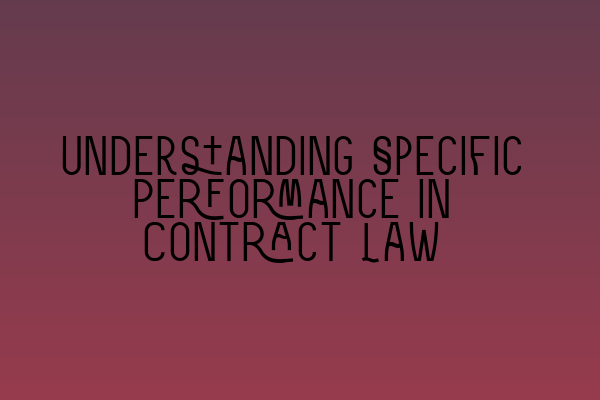Understanding Specific Performance in Contract Law
In the world of contract law, disputes are bound to arise. Whether it’s a breach of contract, non-performance, or any other issue, it is important to understand the various remedies available to parties involved. One such remedy that often comes into play is specific performance.
Specific performance is a legal remedy where a court orders a party to perform their contractual obligations as agreed upon in the contract. It is typically sought when monetary damages are inadequate or when the subject matter of the contract is unique or rare. This remedy is often used in cases involving real estate, artwork, or highly specialized goods or services.
To better comprehend the concept of specific performance, let’s delve into its key components:
1. Enforceability of Contracts:
To fully appreciate the significance of specific performance, it is crucial to understand that contracts are legally binding agreements between parties. When parties sign a contract, they willingly assume obligations and responsibilities. Should one party fail to fulfill their contractual duties, they are deemed to have breached the agreement.
2. Breach of Contract:
A breach of contract occurs when one party fails to perform their obligations as stated in the contract. This can include failure to deliver goods, failure to pay for services, or any other form of non-performance. When a breach occurs, the non-breaching party may seek remedies, such as specific performance, to enforce the contract.
3. Standard Damages vs. Specific Performance:
By default, the injured party is entitled to claim monetary damages as compensation for the breach of contract. However, there are instances where monetary damages alone are inadequate to make the injured party whole. In such cases, specific performance can be sought as an alternative remedy.
4. Uniqueness of the Contracted Subject Matter:
Specific performance is often sought when the subject matter of the contract is unique, rare, or irreplaceable. For example, if a buyer enters into a contract to purchase a specific piece of artwork or a one-of-a-kind antique, standard damages would not adequately compensate them in the event of a breach. In such cases, the buyer may seek an order for specific performance to compel the seller to deliver the agreed-upon item.
5. Discretion of the Court:
It is worth noting that specific performance is not granted as a matter of right. The court has discretion in determining whether specific performance is an appropriate remedy in a particular case. Factors such as feasibility, practicality, and availability of alternative remedies are taken into account by the court when making this decision.
6. Exceptions to Specific Performance:
There are certain exceptions where specific performance may not be granted. For example, if the performance of the contract would be unduly burdensome, unfair, or impossible, the court may choose to award monetary damages instead. Additionally, if the injured party has acted unfairly, dishonestly, or in bad faith, specific performance may be denied.
7. Seeking Legal Advice:
If you find yourself in a situation where you believe specific performance may be an appropriate remedy, it is crucial to seek professional legal advice. An experienced contract law solicitor can assess your case, provide guidance on the available remedies, and present your claim effectively in court.
In conclusion, specific performance is a valuable legal remedy in contract law, particularly when standard damages are inadequate or the subject matter of the contract is unique. However, it is important to understand that specific performance is not automatically granted and depends on the discretion of the court. Seeking legal advice is essential to navigate the complexities of specific performance and other remedies available in contract law.
For further insights into contract law and related topics, check out these articles:
– Exploring the Impact of Frustration on Contractual Obligations: Legal Insights
– Interpreting Contractual Clauses: Unlocking the Hidden Meanings
– Legal Aspects of Business Contracts: Key Considerations for Entrepreneurs
– SQE Contract Law vs. Traditional Qualifications: A Comparative Analysis
– Agreements in Contract Law: Understanding Its Various Types
Remember, understanding the nuances of specific performance and contract law can greatly impact your ability to protect your rights and seek appropriate remedies in the event of a breach.
